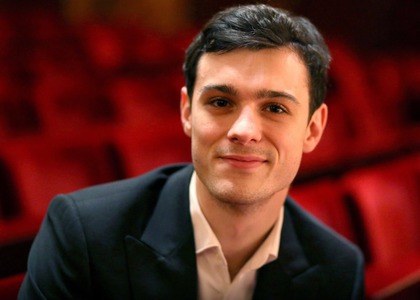> [Archived] Interviews

Interview with pianist George Todică (II)
The pianist George Todică, awarded the Second Prize in the International Contest "George Enescu," 2022 edition, will hold a recital on the big stage of the Romanian Athenaeum on Saturday, May 13th, at 19 PM.
The event was organized by Radio România Muzical and Rotary Club Pipera as part of the project "The Heirs of Musical Romania" and will be broadcast on our radio station.
What inspired you to take the decision to participate in the contest "George Enescu" last year?
The "George Enescu" contest is the ultimate goal and the greatest honour for a Romanian pianist. Before you find out about the Tchaikovsky, Liszt, or Chopin contests, which are considered the most relevant contests worldwide, the Enescu contest is, of course, the most important for us, the Romanian people, because it is part of our cultural and historical treasure. It has always been my goal, and even after I decided that I should stop entering competitions and slow down a little, I couldn't let go of this dream of participating in the Enescu contest.
How much does the laureate status of the International Contest "George Enescu" mean to a young musician?
It depends on the person. The fact that I succeeded in winning an award means a lot to me. I have been over seas for 10 years, and with each passing year, I feel a deep yearning to return here, at least for the artistic activity, if not completely. So, this contest gives me the opportunity to return gloriously, strongly, and dearly to Romania.
What did attending this competition mean to you, and what impact did it have on your career?
Currently, the biggest impact is the invitation to perform at the Atheneum, in the Great Hall, alone - it is a privilege! - and all the doors that opened for me in Romania. Because, as I said earlier, with each passing year, a new constellation of Romanian artists comes to the fore, and I am proud to see them evolve.
Are the emotions and pressure more intense when you perform at home, given that you have been living in England for over 10 years, as you said?
Yes, indeed, they are more intense! And the happiness of performing is stronger than it is in another place. I think the pressure comes from there-the fact that you really want to give more than anywhere else.
The concert on May 13th at the Romanian Atheneum is held under the auspices of" The Heirs of Musical Romania" and is produced in co-production with Artexim. How do you appreciate the importance of this event?
First of all, I deeply appreciate the support and care that Radio România Muzical and Artexim have shown me, especially since I am a second-prize laureate at the Enescu contest. Often, during competitions, all the attention goes to the first prize, and rightfully so, but I deeply appreciated the support and that both institutions took me under their wing and collaborated to make this recital possible. So, I am looking forward to seeing what the future years will bring.
At the Romanian Atheneum recital, you will be presenting pages composed by George Enescu, Maurice Ravel, Sergei Rachmaninoff, and Frederic Chopin to the audience. How do you choose the pieces that you present to the public?
Often, my instinct leads me towards a group of pieces. I choose music that I enjoy playing, and then I think about why this music gives me pleasure to play. And I find the themes and motifs that connect them. Most of the repertoire in the Athenaeum concert is somehow inspired by tradition and the idea that these composers are great because they understan dtradition, culture, where they come from, and where European and global culture comes from, not just their individual music. This is what bonds them, for example, Enescu, Ravel, and Rachmaninoff. And, of course, Chopin is linked to his traditional music. I am very committed to promote Romanian music, so I insisted on playing Enescu not only because I am a laureate of the competition but also because I always play Enescu or other Romanian music in piano concerts. So, this time was no exception.
Do you have a routine that you follow before a recital?
Not necessarily. The most important routine is having an efficient sleeping schedule, I need to be well-rested. When I am well-rested, I can be veryflexible with any change of the routine.
As you stated, Enescu's works are constantly present in your recital programs. When did you discover Enescu's music, and how do you feel when you interpret it?
I discovered Enescu's work quite young, precisely when I was 7 years old, that was the moment when I heard the Rhapsodies for the first time. But I started playing piano music when I was 14-15 years old, and I feel very connected to it and to the path Enescu took when he went to the West to study and understand global music, before affirming his personal sound. Suite No. 2 depicts an excellent portrait of Enescu-the piano is in fourth place, possibly; he was a violinist and then a composer, then a conductor-and it shows to the audience not only pianistically what an extraordinary person he was to have been able to compose something like this even though it was not his main instrument.
Translated by Roberta Ana-Maria Gulerez,
University of Bucharest, Faculty of Foreign Languages and Literatures, MTTLC, year II
Corrected by Silvia Petrescu














